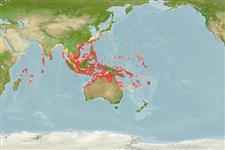Actinopterygii (ray-finned fishes) >
Perciformes (Perch-likes) >
Lutjanidae (Snappers) > Lutjaninae
Etymology: Lutjanus: Malay, ikan lutjan, name of a fish.
Environment / Climate / Range
Ecology
Marine; brackish; reef-associated; depth range 10 - 72 m (Ref. 9710). Tropical, preferred ?; 35°N - 26°S, 50°E - 180°E (Ref. 55)
Indo-West Pacific: Seychelles, then southern India to New Caledonia and Gilbert Islands, extending northward to the Ryukyu Islands Replaced by Lutjanus ophuysenii from southeastern China and Taiwan to southern Korea and Japan (Ref. 37816).
Length at first maturity / Size / Weight / Age
Maturity: Lm 15.4, range 14 - 22 cm
Max length : 40.0 cm TL male/unsexed; (Ref. 55); common length : 35.0 cm TL male/unsexed; (Ref. 5450); max. reported age: 12 years (Ref. 37970)
Dorsal
spines
(total): 10;
Dorsal
soft rays
(total): 12-14;
Anal
spines: 3;
Anal
soft rays: 8 - 9. Dorsal profile of head moderately sloped. Preorbital width about equal to eye diameter. Preopercular notch and knob poorly developed. Scale rows on back rising obliquely above lateral line. Generally whitish or pink with a yellowish brown to black stripe on the middle of the side. Juveniles and sub-adults with an intensely black mid-lateral stripe and an oval black spot, eye-sized or greater, lying in the middle of the stripe below last dorsal spines. Adults with yellow median fins (Ref. 48635). Body depth 2.6-3.0 in SL (Ref. 90102).
Adults are found in the vicinity of coral reefs, also areas with flat bottoms and occasional low coral outcrops, sponges, and sea whips. They occur singly or in groups of up to about 30 individuals. Feed on fishes, shrimps, crabs and other benthic invertebrates.
Sex ratio differed significantly from 1:1 above 30 cm fork length (Ref. 4840). Larvae grow at a rate of 1.2 to 1.7 mm per day during the first 1 or 2 months.
Allen, G.R., 1985. FAO Species Catalogue. Vol. 6. Snappers of the world. An annotated and illustrated catalogue of lutjanid species known to date. FAO Fish. Synop. 125(6):208 p. Rome: FAO. (Ref. 55)
IUCN Red List Status (Ref. 115185)
CITES (Ref. 94142)
Not Evaluated
Threat to humans
Harmless
Human uses
Fisheries: commercial; aquarium: public aquariums
Tools
Special reports
Download XML
Internet sources
Estimates of some properties based on models
Phylogenetic diversity index (Ref.
82805): PD
50 = 0.5000 [Uniqueness, from 0.5 = low to 2.0 = high].
Bayesian length-weight: a=0.01413 (0.01228 - 0.01625), b=2.98 (2.95 - 3.01), in cm Total Length, based on LWR estimates for this species (Ref.
93245).
Trophic Level (Ref.
69278): 4.0 ±0.3 se; Based on diet studies.
Resilience (Ref.
69278): Medium, minimum population doubling time 1.4 - 4.4 years (K=0.22-0.70; tmax=12).
Prior r = 0.85, 2 SD range = 0.6 - 1.20, log(r) = -0.16, SD log(r) = 0.17, Based on: 1 M, 5 K, 2 tgen, 1 tmax, records
Vulnerability (Ref.
59153): Moderate vulnerability (38 of 100) .
